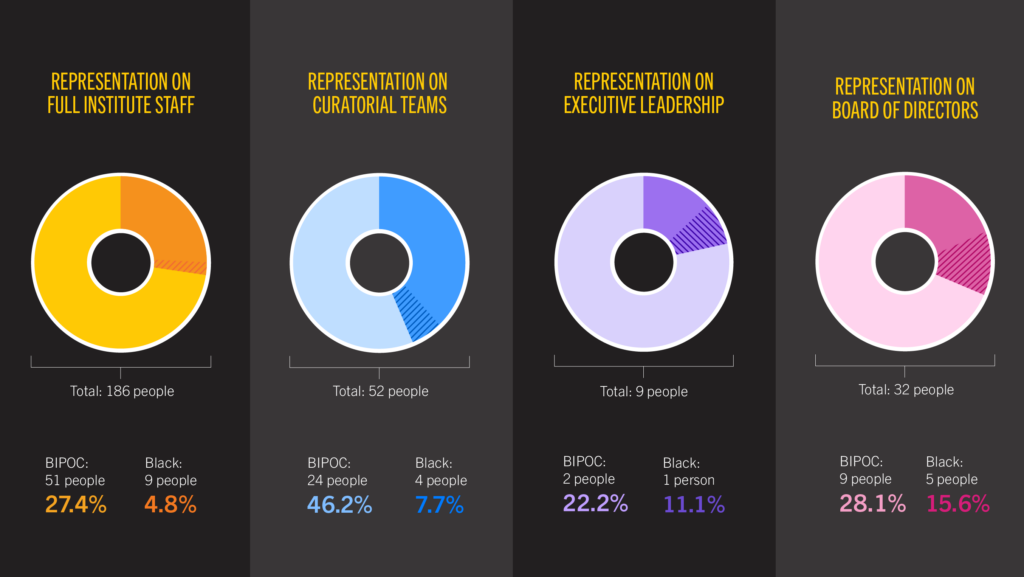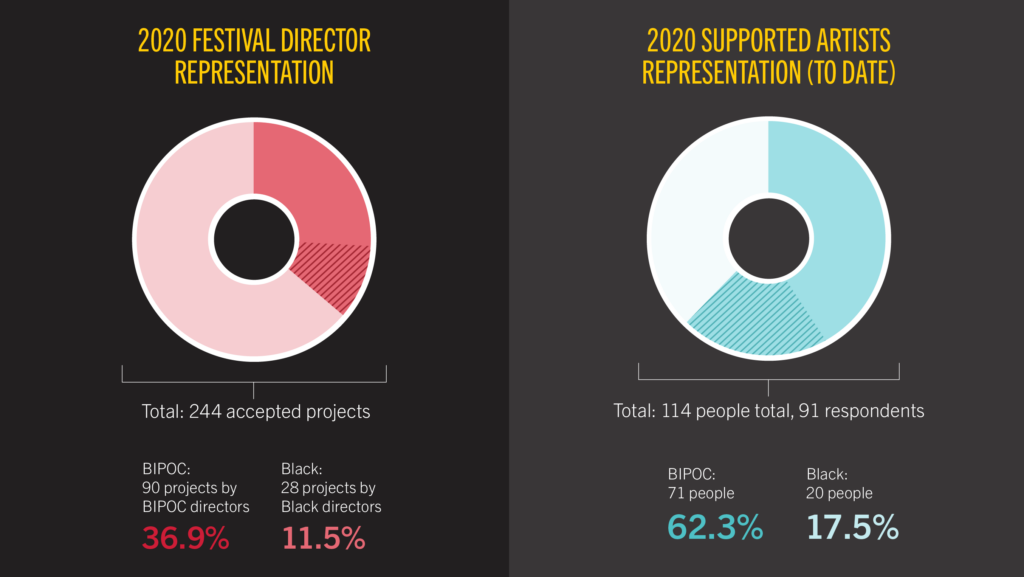Black Lives Matter
Dear Sundance Community,
Sundance Institute denounces white supremacy and unequivocally supports Black Lives Matter.
As we confront our country’s long history of lives lost due to police terror, we continue to grapple with the effects of a pandemic that starkly reveal the inequities within our society. In the independent artist community, largely freelance creative workers, the impact of racism and the pandemic has been especially significant for artists who are Black, Indigenous, and People of Color (BIPOC).
Two weeks ago, I made the decision that because I am an organizational leader who is white, I would hold my voice to listen, learn, and reflect on my own privilege or bias before I spoke. I am humbled to witness how far we all have to go in this nation and how poorly we are educated about (or refuse to accept) the truth of the Black American experience, even though that truth has always been available to us.
Now is the time to commit to actions, even as we recognize the need for much more listening and learning ahead. Driven by the moral imperative to act, advised by our staff of color, and heeding the call of the Black artists demanding change, I am sharing today some commitments from Sundance Institute.
Sundance Institute has been supporting and presenting work from independent film, theater and media makers for 40 years, from the moment Robert Redford invited Native American artists to participate in the founding meetings of the Institute. We are proud to have supported the creative practices and careers of many artists whose stories have been historically underrepresented in the generations since then. Today, this work continues with our Indigenous Program serving as the model for our strategic work with communities of color, women, and people with disabilities. Yet as an organization founded and led by white people, we also recognize the ways we have contributed too long to an unjust ecosystem for artists and staff. In this time of global uprisings in response to the murder of George Floyd and state-sanctioned police terror, we have consulted with our BIPOC staff, held space to listen, taken effort to protest, and reflected on the accountability and actions we need to take now on a determined path to anti-racism.
On this journey, we commit ourselves to candor, transparency, and to the long-term work required to yield real change.
Our staff composition and workplace culture must be diverse, inclusive, and equitable.
Diversifying our teams alone will not lead to true justice without more deeply considering retention, promotion, and workplace culture. But diversity at all levels is critically necessary. Without fully representing our society, we fall short of our values. Today, we are sharing data about the composition of our staff and Board. The numbers clearly show that, at a minimum, we must improve the number of BIPOC staff at all levels of the organization, but particularly at leadership levels. We acknowledge this change won’t happen overnight, but we will hold ourselves accountable for reporting our annual progress publicly, and we commit to making this work a priority until the Sundance Institute team reflects the world we live in, the artists we support, and is one that can do its work equitably and with justice.

Our work supporting artists:
With highly selective programs for artists, including the Sundance Film Festival and our Lab programs, we recognize that the curatorial staff at all levels must represent the full spectrum of voices. In addition to our staff, we commit to aligning the demographics of our readers, screeners, evaluators, and seasonal curators in a manner which reflects genuine inclusion and equity. We are gathering our baseline data now and will accelerate this alignment to happen with the next wave of hires. We further commit to achieving our goal within a year if not sooner.
As has been our practice for several years, we commit to sharing the demographic data on all the artists we support as well as Festival submissions. We are proud to have been part of supporting the careers of many notable BIPOC artists working in film, theater and television today. We see new cohorts of diverse voices across our programs each year, yet we frequently hear from the industry that there is a shortage of BIPOC talent. In fact, our own research (done together with Stacy Smith and team at USC as part of a long collaboration) reveals a highly diverse talent pool eager to enter the industry. This is the time to end that myth and elevate the incredible artists across the field.

We acknowledge that our Festival and Labs have not always been safe spaces for people of color, and we are committed to correct that and to right past wrongs where we can. Specific to the Festival, we recognize that BIPOC attendees — audiences, artists, and staff — have not always felt safe with the police presence on the streets in Utah, based on both the broader patterns of police violence and brutality nationwide, and on specific experiences in Utah. We’ve heard directly from BIPOC festival goers and staff that they’ve experienced racism with security and door staff. We are committed to making our spaces safe, welcoming, and inclusive for all.
- We have begun convening our BIPOC artist community to listen and learn.
- We will conduct a survey of our BIPOC artist community in accordance with a dialogue we began and commitments we made in collaboration with artists after this year’s Festival. We will launch this survey during the summer with support from an outside racial equity evaluator.
- As a convener of large, live events, we are committed to reimagining safety and security at our Festival, in a way that centers the experiences of festival goers of color, to ensure that all feel welcome and free of harassment.
- We will establish a process for attendees to issue complaints outside of law enforcement and provide dedicated safe spaces at our Festival.
- We will require that all sponsors and official venues at the Festival provide security and door staff with mandatory anti-racism training prior to the Festival with a Sundance Institute–approved vendor. We will include this in our renewal agreements with sponsors now. For certain smaller organizations and local businesses that may not have resources or access to training, we are in dialogue with potential sources of subsidies and partnerships to deliver training in collaboration with us and an outside racial equity consultant.
Multi-Year Racial Equity Plan:
We understand it is deep, long-term work to truly interrogate and improve our practices and culture to center equity and justice and eliminate racism woven into the fabric of our organization. We commit to a multi-year racial justice plan, supported with dedicated resources committed in our annual budget. Our Board recognized that this investment is critical and, despite the financial strain on our organization resulting from the pandemic, has approved spending beyond our budget to achieve it. A thoughtful, long-term racial equity and justice plan that we can all be proud of can’t be developed in a couple of weeks. But there are a few priorities among the full audit of our practices that we commit to now:
- Analyze pay equity, retention, and engagement among BIPOC staff to improve justice.
- Evaluate all aspects of the hiring process to eliminate racism and bias, including job descriptions and interviewing practices.
- Reassess the diversity and values of the vendors, sponsors, and contractors we do business with, and develop anti-racist guidelines for selection.
- Develop a public-facing inclusion values statement to center racial justice and create accountability for all managers.
- Establish a racial equity analysis practice, supported by training and tools, in all projects and decision-making processes.
Looking ahead:
As our plans develop, we commit to sharing updates in a new digital hub we will build to complement our anti-racism resources hub, built by our Inclusion Staff Team. Realizing we have work to do, and building on our recent efforts to deepen our diversity, equity, and inclusion work, we are making a long-term and public commitment to disrupting systemic oppression, racism, and anti-Blackness inside our organization and through our programs. Today, Sundance Institute asks our constituents to hold us accountable, as we will hold ourselves, for achieving measurable and steady progress toward justice.
In solidarity,
Keri Putnam
Executive Director
